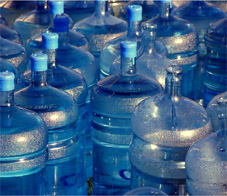How is BPA Used in Food Packaging?
BPA is one of the most ubiquitous plastic additives, and is found in such objects as sunglasses, CD cases and plastic storage containers. Bisphenol A is an industrial chemical known as 2,2-bis(4-hydroxyphenyl)- propane (C15H16O2 ) used as the starting material for the production of polycarbonate plastics and synthetic resins. Because of its ability to make plastic rigid, BPA is found in polycarbonate containers that come into contact with foodstuffs such as re-useable water bottles, baby bottles, plastic tableware, and microwaveable and storage plastic containers, and residential and office drinking water storage tanks and wine vats. It is also found in the internal epoxy resin coating (lacquer) on cans, including infant formula cans, used for foods and beverages. In some circumstances, chemicals in food packaging can migrate into the food product, and vice versa, depending on the nature of the packaging and the food it contains. "BPA exposure in humans through food contact applications may occur through adult use of food contact articles or infant exposure through maternal transfer, the use of ready made (liquid) infant formula or the use of PC plastic bottles," according to the FDA. In 1988, the Society of the Plastics Industry, Inc. introduced a coding system for different types of plastics for the purpose of simplifying the process of sorting and recycling plastic bottles and containers. Plastics identified by codes 1 through 6 do not use BPA in their manufacturing process. Code 7 is used to identify "Other Plastics", of which polycarbonate is one type; however, the majority of code 7 plastics are not polycarbonate.
Bisphenol A is an industrial chemical known as 2,2-bis(4-hydroxyphenyl)- propane (C15H16O2 ) used as the starting material for the production of polycarbonate plastics and synthetic resins. Because of its ability to make plastic rigid, BPA is found in polycarbonate containers that come into contact with foodstuffs such as re-useable water bottles, baby bottles, plastic tableware, and microwaveable and storage plastic containers, and residential and office drinking water storage tanks and wine vats. It is also found in the internal epoxy resin coating (lacquer) on cans, including infant formula cans, used for foods and beverages. In some circumstances, chemicals in food packaging can migrate into the food product, and vice versa, depending on the nature of the packaging and the food it contains. "BPA exposure in humans through food contact applications may occur through adult use of food contact articles or infant exposure through maternal transfer, the use of ready made (liquid) infant formula or the use of PC plastic bottles," according to the FDA. In 1988, the Society of the Plastics Industry, Inc. introduced a coding system for different types of plastics for the purpose of simplifying the process of sorting and recycling plastic bottles and containers. Plastics identified by codes 1 through 6 do not use BPA in their manufacturing process. Code 7 is used to identify "Other Plastics", of which polycarbonate is one type; however, the majority of code 7 plastics are not polycarbonate. Headlines in September
On one Tuesday in September, a study on the effects of the plastic additive on human health again made headlines in the United States. The results of the study likely would have stirred more controversy worldwide if it had not been overtaken by a scandal over another plastic additive, melamine, which unscrupulous traders in China had added to raw milk used to make infant formula and that led to kidney stones or renal failure or both in over 56,000 babies, four of whom died. Higher levels of urinary BPA, a chemical compound commonly used in plastic packaging for food and beverages, is associated with cardiovascular disease, type 2 diabetes and liver-enzyme abnormalities, according to a study1 in the September 17 issue of JAMA. The study was released to coincide with a US Food and Drug Administration hearing on BPA. UK scientists including David Melzer, M.B., Ph.D., of Peninsula Medical School, Exeter,Nike Air Max 1 For Sale













